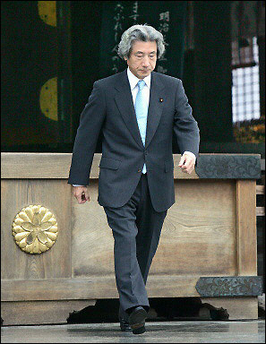|
Koizumi talking: 'Yasukuni card' won't work
(Agencies)
Updated: 2005-12-05 17:02
Japanese Prime Minister Junichiro Koizumi put the blame
on China Monday for postponing an annual summit of Japan, China and
South Korea, claiming that Beijing cannot use his visits to a war shrine as a
diplomatic card.

Japanese Prime
Minister Junichiro Koizumi leaves the controversial Yasukuni war shrine in
October 2005.[AFP] | Ties with China and South Korea have been chilled by
Koizumi's annual visits to Tokyo's Yasukuni shrine.
Koizumi has defied protests and visited the Shinto sanctuary five times while
in office, most recently on October 17, triggering protests from the two Asian
neighbours.
"Yasukuni isn't something that can be used as a diplomatic card. Even if
China and South Korea try to use it as a diplomatic card, that won't work,"
Koizumi told reporters.
Koizumi defended his visits to Yasukuni, which honours war
criminals with other war dead.
"Those who criticize it are wrong," he said.
China said on Sunday that the annual summit with Japan and South Korea due in
mid-December had been postponed. The decision comes at a time when Japan's
neighbours continue to question its remorse for past aggression.
China's Foreign Ministry said the summit, to have taken place on the
sidelines of a regional conference in Malaysia, has been postponed to an
appropriate time due to the "current atmosphere and conditions."
The three-way summit has been held every year since 1999.
"I wouldn't mind holding it at any time. But if they want to postpone it,
that's fine," Koizumi said.
China also ruled out any meeting between President Hu Jintao and Koizumi on
the sidelines of the Asia-Pacific Economic Cooperation (APEC) summit in November
in South Korea.
Summit host, South Korean President Roh Moo-Hyun, met Koizumi but said it was
only to show him courtesy as a guest and used the encounter to denounce his
visits to the shrine.
Koizumi's Yasukuni visits are also domestically controversial with numerous
lawsuits filed against his pilgrimage, mostly on the grounds that it violates
the constitutional separation of religion and state.
|